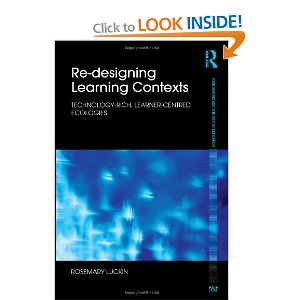A recent article in the THES got me thinking. David Matthews reported under the title: The robots are coming for the professionals, and asked if universities need to rethink what they do and how they do it now that artificial intelligence is beginning to take over graduate-level roles? This motivated me to write a blog post for THES that was published on 9 August: Four ways that artificial intelligence can benefit universities, in which I suggested that HE needs to embrace the positives of AI, not just look at the negatives.


These issues are not limited to HE, in fact this is a wake up call for all of Education. We must engage with these technologies and those who are developing them NOW in order to ensure that the AI that we end up with in classrooms, homes and the workplace is informed by what we know about learning and NOT what we know about what the technology can do.
 There is a huge and growing interest among those who invest in new technology ventures, specifically Artificial Intelligence (AI) techniques and methods. For example, between 2011 and 16 May 2016 Sentient Technologies received over 143 million USD in funding (Data from CB Insights) Much of the excitement about AI has focused on general purpose AI i.e. intelligence that is applicable across a variety of industries and activities. This is being promoted for technology businesses as a force for good. For example, Antoine Blondeau, the CEO of Sentient, has stated that: “From healthcare to finance to e-commerce, we’re focused on changing people’s lives.” Sentient is reported to be working on financial platforms and on an AI nurse to diagnose patients with sepsis.It is a business that like many who are adopting AI methods has no problem in attracting funding.
There is a huge and growing interest among those who invest in new technology ventures, specifically Artificial Intelligence (AI) techniques and methods. For example, between 2011 and 16 May 2016 Sentient Technologies received over 143 million USD in funding (Data from CB Insights) Much of the excitement about AI has focused on general purpose AI i.e. intelligence that is applicable across a variety of industries and activities. This is being promoted for technology businesses as a force for good. For example, Antoine Blondeau, the CEO of Sentient, has stated that: “From healthcare to finance to e-commerce, we’re focused on changing people’s lives.” Sentient is reported to be working on financial platforms and on an AI nurse to diagnose patients with sepsis.It is a business that like many who are adopting AI methods has no problem in attracting funding.
However, the same is not yet true of organisations who are adopting AI for education. Yes, there are things like Udacity, that claims it will change HE, and Knewton whose CEO Jose Ferreira, really does believe that his technology will replace human teachers. Such an outcome would make ‘driverless classrooms’ into a science reality. These commercial AI in Education ventures are well funded. BUT it is hard to find mass investment in the application of AI to education, despite the fact that the Educational Technology sector is predicted to grow from £45bn to £129bn by 2020. And to my mind much more significantly, despite the fact that education is the real key to changing people’s lives.
We need to take a fresh look at education if we are to ensure that the global population is able to reap the potential of the AI revolution that is sweeping across the workplace. AI is both a cause of the radical changes to the workplace that prompted David Matthews to write his piece in the THES and a provider of an answer to the problem of how we make the most of the workplace automation that AI is enabling. The purpose, methods and outcomes of education need re-thinking and AI can help us to tackle the challenge of this re-thinking if we invest in its development and build on the thirty years plus of research in AI for Education.
The importance of the social and economic significance of the developments in autonomous systems and AI was reflected at the annual meeting of the World Economic Forum 2016 in Davos, where the focus was on ‘The Fourth Industrial Revolution‘. This revolution “is characterized by a range of new technologies that are fusing the physical, digital and biological worlds, impacting all disciplines, economies and industries, and even challenging ideas about what it means to be human.” These radical changes do not however seem to manifest themselves in a concerted effort to use AI to revolutionize education. This oversight is shortsighted to say the least. The few exceptions that one can find where AI is being applied to education at some scale have a very narrow perspective and are a long way from changing people’s lives in the positive way that we want and need. For example: Knewton, is just one a a host of companies who believe that Subject Knowledge is the key to unlocking education for all. Through, for example, making artificially knowledgeable adaptive tutors who can personalize their content to meet an individual learner’s needs. This is all very well, but there is so much more to education than subject knowledge and so much more to AI than adaptive educational content
So what are the key attributes of AI for Education that will enable it to start attracting the sort of investment that Horizons Ventures and Tata Communications have made in Sentient Technologies? What are the attributes of AI that will persuade research funders that AI for education is a subject they must prioritize and that it must be a truly interdisciplinary enterprise that is not driven purely by technologist’s dreams. For a change let’s focus on disadvantaged learners’ dreams and see if we can work with technology to turn these dreams int o reality.
One key attribute of AI for Education is the ability that Educationally driven AI techniques and algorithms bring to the analysis of the vast amounts of data about learners that is routinely harvested by the increasing amount of technologies in the world around us from CCTV, to smartphones, wearable technologies and online courses, such as MOOCs. For example, we can
- Conduct fine-grained analysis of learners’ skills and capabilities so that their development can be tracked at the student/employee, workplace, school, area, and country level;
- Enable the collation of a dynamic catalogue of the best training and teaching practices across a range of environments and as a result enable us to educate and train the future workforce in an economically productive manner.
A second key attribute of Educationally driven AI is that it can help us to tackle the toughest educational challenges, including learner achievement gaps, teacher skill shortages, continuous professional development for educators. If we think about the business of education for a moment, imagine the AI teaching assistant that can be used to stretch the brightest pupils, while the human teacher devotes their expertise to giving the less able learners the sensitive human support that they need in order to progress. The teacher would train their personal assistant to work in the way that the teacher and their students need and would demand that the AI assistant explain the decisions it has made about students and the educational opportunities the assistant has provided.
But perhaps what we need to focus on first is using AI systems that go beyond the machine learning and neural network techniques that dominate the work of the main AI protagonists within and beyond education, from Knewton to Google DeepMind. The types  of AI we need within education is the AI that enables the technology it powers to explain its reasoning, to justify its decisions and to negotiate with its users. This is the sort of AI technology that could help us address one of the toughest challenges within the current workplace: The lack of understanding about how humans can best work with AI systems so that the result is AI augmented human intelligence that is greater than the sum of its parts. We need workers who understand how to make the best use of the power that AI automation can bring to industry and commerce. Workers who understand enough about AI to know where and how human intelligence can work with AI to achieve a blended intelligence that can increase productivity. And what is beautiful about all this is that the appropriate type of AI can help us educate and train people to understand enough about their AI colleagues to work alongside them effectively.
of AI we need within education is the AI that enables the technology it powers to explain its reasoning, to justify its decisions and to negotiate with its users. This is the sort of AI technology that could help us address one of the toughest challenges within the current workplace: The lack of understanding about how humans can best work with AI systems so that the result is AI augmented human intelligence that is greater than the sum of its parts. We need workers who understand how to make the best use of the power that AI automation can bring to industry and commerce. Workers who understand enough about AI to know where and how human intelligence can work with AI to achieve a blended intelligence that can increase productivity. And what is beautiful about all this is that the appropriate type of AI can help us educate and train people to understand enough about their AI colleagues to work alongside them effectively.
